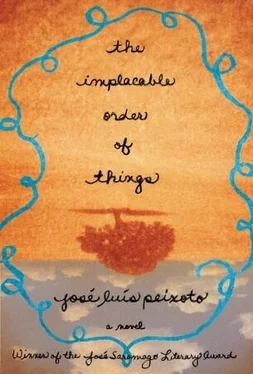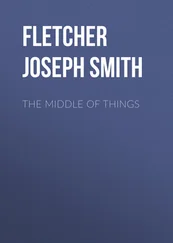MY HANDS. MY ARMS. THE SUN. I feel my arms open to the sun that floods me, that pierces me and is me. I feel my hands crucified in the light that flows and slides into me like a vertical river. I feel her gaze like this sun. My hands. Her gaze. The sun. And I know that my hands are still and silent and useless and dead. I know that her gaze doesn’t see me. I know the sun is defeating me. The bedroom. The bed. I think: the place of men is a line drawn between despair and silence. And once more her gaze. Etched with fire on the inside of all that’s impossible for me. As if the words I never told her were now shooting out from this sun and making my skin burn. Like a storm of voices. Like blades flying inside my body. In this light, the words I never told her. This sun which is my eyes’ blindness and my knowing they’re blind. And once more the bedroom. The blackness beyond me, which I don’t see and I see, for I know it exists and know how its shadow awaits me. And her solitary, forlorn eyes also inhabit that blackness.
I slowly get up. I feel my hands, I feel the dark bedroom in my eyes. It’s now morning of this day. How much time has gone by under the sun? No one knows. The days pass. I think: one day can be a thousand years. I think: no one knows if a day, a thousand years, or a fleeting hour has gone by in a day that passes. I slowly get up. I feel my legs, I feel the floor, I open the door. Next to the fire, my widowed mother. The black glow of her haggard and peaceful face. I sit down next to her. The mild heat radiating from the flames wraps me slowly, trying to hold me with its arms the same way it holds my mother. My widowed mother. We don’t look at each other, and yet our gazes meet in the fire. Among the embers, our steady gazes look at each other as if for the first time. They bashfully touch over the tiny flame of a young twig. They reach out their hands. They feel each other’s skin against their own. And the faces of our gazes plead over the fire, indifferent to the heat. They look at each other. They look at each other. And they understand the sorrows they tell, looking at each other. And in a moment outside time they slowly approach, like two trees that love each other, slowly, and embrace. Mother and son. I lift my head. My mother’s gaze remains. I free myself from the web woven around me by the heat. I open the door. The dew is drying on the brown grass. The sun is rising from the earth. I look straight at it.
BEFORE LEAVING FOR WORK, Salomão stared long and hard at his wife. He stopped stirring the spoon in his coffee and looked at her, as if he suspected something. She turned this way and that, taking care of her mother’s breakfast, looking only at what she needed next. Salomão continued stirring his coffee and then left for the carpenter’s shop. He acted suspicious and suspected nothing. Only a week later, at bedtime, did he understand. His wife got undressed, he looked at her distractedly, then looked at her attentively, saying come over here, and he put his hand on her belly. He looked her in the face, and she almost looked at him. The widowed cook, like a dead woman who talked, slept and whispered her endless story to a corner of the bed. He slowly removed his hand from her belly, still feeling that figure, still with the shape of that slight mound in the palm of his hand and in his slightly curved fingers. He thought to kiss her but didn’t, even though he had never had nor would ever again have a more fitting opportunity. Without moving he watched as she put on her nightgown, lit up only by the dim glow of the kerosene lamp.
The next morning he woke up before daybreak and was the first to arrive at the carpenter’s shop. When he heard the sound of Master Rafael’s crutch, he ran outside and announced I’m going to be a father before anyone could even say good morning. Master Rafael, who acted like a gleeful young man ever since finding out about the imminent birth of his own son, patted him on the back and smiled. And with that enthused smile, they walked together the several yards separating them from the gate. They worked all morning. Master Rafael didn’t come near him again until shortly before lunch. He told the apprentice to go on home, relaxed his smile and said, amid the mist of sawdust that swirled in the shop and was slowly beginning to settle, I’m worried. Salomão, immediately sharing his concern, looked at him and waited. And Master Rafael told him that at night, when going to sleep, he would place his hand on the blind prostitute’s belly and not feel the slightest kick, or any movement at all. And he’d stay awake listening to the night’s every sigh. Sometimes, in his sleeplessness, he seemed to feel something, but when he concentrated all his sensations in his hand, he felt nothing but unmoving skin, and that previous moment when he’d felt something dissolved in his memory like dust. In the morning she would avoid him, ashamed. And her eight-month-old belly was no more than an inert mound.
I DON’T KNOW IF IT’S THE SILENCE that tortures me. The encompassing anguish of silence. The old sheepdog passes by and looks at me, and I don’t feel her gaze. As I silently undo the wires of the gate, my hands feel nothing but silence and its vacant texture, its emptiness against my skin. I don’t know if I’ve gone mad. Everything I desire is impossible in this silence. I think: the place of men is a line drawn between despair and silence. I’d like to be reborn, to start off fresh. But I continue. I follow the sheep, knowing each of their movements and feeling all of their weariness. And I slowly die. I’m vanishing with each movement of this world, which no longer has anything to offer me. I’ve become my own shadow. I’ve become a shadow of a shadow of a shadow of myself. I’m vanishing into time and silence. I think: the place of men is a line drawn between despair and silence. I’m slowly dying.
MASTER RAFAEL AND SALOMÃO went their separate ways on the streets leading them home. At that hour lunch was waiting for them amid the evasive glances of their wives. As they walked to their respective homes under the same sun, Master Rafael thought of Salomão’s naïve joy, and Salomão thought of Master Rafael’s anguish. They crossed the threshold at the same time. They felt the shade cover their skin with a coolness that disagreed with Master Rafael but that was soothing to Salomão, and they went back to thinking of themselves. Salomão sat down. Master Rafael laid his crutch on the table and sat down. The table was already set for both. The blind prostitute bustled about the kitchen, dodging Master Rafael’s veering head, whose wide-open left eye tried to follow her motions. Salomão’s wife ran between the widowed cook and the stove, stirring the water and soup that boiled inside the pot, and making her mother comfortable in her chair. Both women put the food on the table at the same time; both sat down at the same time. Salomão’s wife began to spoon soup into her mother’s panting mouth. The blind prostitute calmly began to eat. Salomão and Master Rafael simultaneously opened their mouths to say something and simultaneously let their words dangle, unspoken, as they swallowed their first spoonful of soup.
I LOOK STRAIGHT AT THE SUN. The trunk of the big old cork tree slowly fuses with my back and turns me into wood. The earth slowly fuses with my stretched legs and turns me into earth. I look straight at the sun. My gaze is sunlight.
MASTER RAFAEL AND SALOMÃO looked at their wives at the same moment and closed the door behind them. Salomão’s boots, touching the earth, kicked a stone here and there. Master Rafael’s crutch and boot, touching the earth, carefully avoided the stones in their path. The sunlight smoldered on their skin. Master Rafael tilted his cap. Salomão tilted his cap. Something slowly died and something slowly lit up in both of them. Master Rafael slowly began to remember Salomão’s naïve happiness. Salomão slowly began to remember Master Rafael’s anguish. And they met, as if they’d expected to, at the point where the two streets met. Together, without talking, they walked to the carpenter’s shop.
Читать дальше












